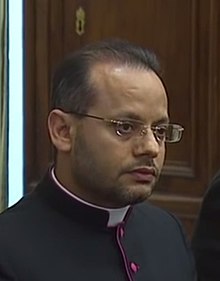
Summary
Yoannis Lahzi Gaid (Arabic: يوأنس لحظي جيد; born 1975) is a Coptic Catholic priest who has served since April 2014 as second personal secretary to Pope Francis. He is the first Eastern Catholic to hold the position.[1]
Monsignor Yoannis Lahzi Gaid | |
|---|---|
| Second Personal Secretary to Pope Francis | |
 Yoannis Lahzi Gaid in 2016 | |
| Diocese | Rome |
| See | Holy See |
| Appointed | 17 April 2014 |
| Term ended | 1 August 2020 |
| Predecessor | Fabián Pedacchio |
| Successor | Fabio Salerno |
| Personal details | |
| Born | Yoannis Lahzi Gaid 5 March 1975 |
| Nationality | Egyptian (with Vatican citizenship) |
| Denomination | Catholic Church |
| Residence | Domus Sanctae Marthae |
Biography edit
Yoannis Lahzi Gaid was born in Cairo, Egypt, in 1975. He was one of seven siblings.[2] He studied at the Coptic Catholic seminary in Cairo.[3] He was ordained priest for Coptic Catholic Patriarchate of Alexandria, Egypt.[4] He studied at the Pontifical Oriental Institute, earning a doctorate in the canon law of the Eastern Churches.[2] He edited a volume of texts from the Code of Canon Law for the Eastern Churches.[5]
He worked for several years as associate pastor of the church of Santa Domitilla in Latina, south of Rome.[6]
He attended the Pontifical Ecclesiastical Academy and in 2007 joined the diplomatic service of the Holy See.[6] His assignments included stints in the Democratic Republic of the Congo and Gabon, and as chargé d'affaires of the Apostolic Nunciatures to Jordan and Iraq.[5][6] He also served as an Arabic translator for Pope Francis at his general audiences and in meetings with Arabic-speaking diplomats and government officials.[1]
On 1 July 2011, Pope Benedict XVI appointed him a chaplain of His Holiness with the title monsignor.[4]
In April 2014 Pope Francis appointed him as his second personal secretary. He continues to work for the Secretariat of State as well. His appointment was interpreted as gesture of support for Eastern Catholic churches and dialog with the Arab and Muslim world. By the time he took on this position, he was already living in the same residence as Pope Francis, the Domus Sanctae Marthae.[5] In rare public remarks for a papal secretary, he praised the development of dialog with Islam, saying that the meeting of Pope Francis and Ahmad al-Tayyib in Cairo in 2017 "gave proof that we can talk, we can talk, we can also love each other people of different religions. Before there was no dialogue, and therefore there was distance, there was also a bit of hostility towards one another. Now there is deep friendship."[7] After the same two leaders issued their Document on Human Fraternity in February 2019, Lahzi Gaid was named in September as one of the first members of a committee to promote its principles.[8] He was also named a member of its executive board.[9]
References edit
- ^ a b Gagliarducci, Andrea (22 April 2014). "Coptic priest appointed personal secretary to Pope Francis". Catholic News Agency. Retrieved 29 November 2019.
- ^ a b Dajani, Haneen (4 February 2019). "Meet the Arabic translator who is always by the Pope's side". The National UAE. Retrieved 29 November 2019.
- ^ "El nuevo secretario papal, políglota y copto católico" [The new papal secretary, multilingual and Coptic Catholic]. La Nacion (in Spanish). 19 April 2014. Archived from the original on 18 April 2015. Retrieved 29 November 2019.
- ^ a b "Cappellani di Sua Santità" [Chaplains of His Holiness] (PDF), Acta Apostolicae Sedis (in Italian), CIII (12), Rome: Vatican: 872, 2011, retrieved 29 November 2019
- ^ a b c Tornielli, Andrea (17 April 2014). "Coptic priest joins Francis' personal secretariat". Vatican Insider. Retrieved 28 November 2019.
- ^ a b c Magister, Sandro (23 April 2014). "Francis has a new secretary. Who speaks Arabic". L'espresso. Retrieved 29 November 2019.
- ^ "Monsignor Gaid: con l'islam è nata una nuova era di dialogo". Vatican Insider (in Italian). 10 February 2018. Retrieved 29 November 2019.
- ^ "A look back: The formation of the Higher Committee of Human Fraternity". The National UAE. 20 September 2019. Retrieved 29 November 2019.
- ^ "Toward Achieving the Goals of the Document on Human Fraternity" (PDF). L'Osservatore Romano. 20 September 2019. p. 9. Retrieved 29 November 2019.


